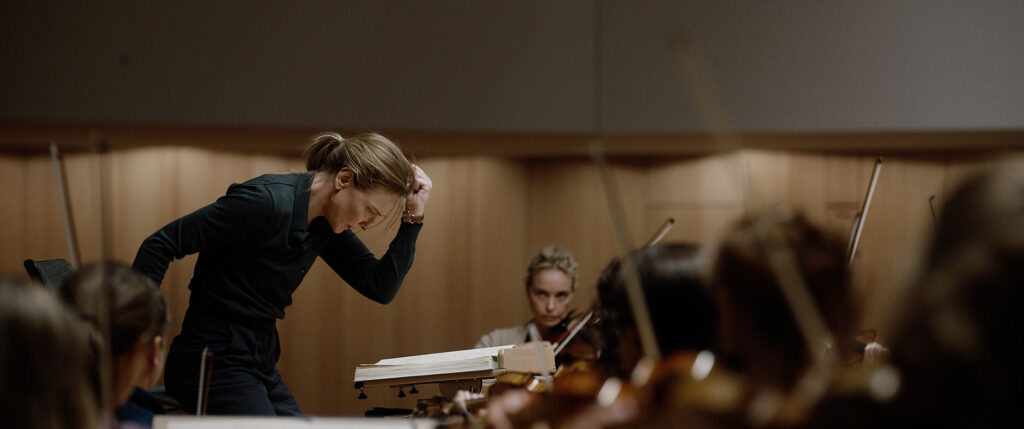
Lydia Tár (Cate Blanchett), is a fictional conductor and subject of the astonishing new film, “TÁR,” opening October 14. She is first seen being introduced by the New Yorker’s Adam Gopnik — he is interviewing her on stage — as one of the most important musical figures today. An EGOT, she graduated from the Curtis Institute and conducted in Philadelphia before her current positions at the New York Philharmonic and as Berlin’s principal conductor. Tár (who is so formidable, she should probably only be referred to by her last name) was mentored by Leonard Bernstein, and like him, she is working on a recording of Mahler’s 5th symphony.
The extended conversation with Gopnik displays Tár’s wit and erudition and shows her at the top of her game. But then, her flirting after the interview with Whitney (Sydney Lemmon), an adoring fan, reveals how Tár may be a superstar, but there is also something hinky about her. (One can hear her loyal assistant, Francesca (Noémie Merlant), roll her eyes witnessing this coquettishness.)
Another remarkable sequence early in the film features Tár teaching a masterclass at Juilliard. As she instructs Max (Zethphan Smith-Gneist), a BIPOC, pangender student, about Bach — whom, as a dead, straight white male, he can’t take seriously — they discuss identity politics. Tár, a self-proclaimed “U-Haul lesbian,” however, is more interested in the music. She explains how a conductor can make the audience hear a piece they know well, differently. She also talks about, “the humility of Bach.”
Writer/director Todd Field’s captivating character study shows that Tár needs to learn some humility herself. With laser-focused precision and detail, the film depicts how Lydia Tár’s ego and pride become her undoing. It is a combination of ambition and aggression that drives Tár, but her behavior soon comes to be viewed as highly inappropriate.

Blanchett gives a tour de force performance that shows exactly what makes Tár tick. It is simply impossible to take one’s eyes off the actress during the film’s entire 157 minutes because she swaggers through with such gusto and bravado it is bewitching. Blanchett, in an Oscar-worthy turn, relishes her every scene, especially an amusing moment where she plays the accordion. Her face is a malleable canvas that conveys so much emotion — haughtiness, exasperation and exhaustion, adoration and adulation, as well as absolute rage and pain — sometimes within the same scene. Whether it’s her listening to musicians’ auditions and expressing agony or ecstasy, or having a meltdown in an airplane bathroom, Tár’s every emotion is visible.
Arguably, she can be at her most expressive when she is poker faced. A scene of Tár threatening her young daughter’s bully at school reveals how she is at once both in control and out of control. It is fascinating to see Tár scheme, but it is also clear her agendas are both personal and professional — and she needs to check her privilege.
It is an hour into the film before Tár is first seen conducting, but she performs her craft with a passion and verve that is mesmerizing; it illustrates her genius. Yet Tár is someone who always conducts, or rather, manipulates, things to her advantage. Some of that may be her entitlement — as when she wants to rotate her assistant conductor Sebastian (out actor Allan Corduner) to another position. But some of it is personal, such as giving Olga (Sophie Kauer), a new cellist Tár becomes smitten with, a plum part in a concert, or taking her along on a trip with the intention of seducing the young woman.
Tár’s attraction to younger women is her Achilles’ heel. She is mostly (and not unexpectedly) unfair to her long-suffering partner, Sharon (Nina Hoss, terrific, but underused), who is a violinist in the orchestra. Sharon endures Tár’s bad behavior until her reckless actions threaten to destroy their family. A subplot involving an incident with a former student of Tár’s has potentially serious and lasting consequences.
Adding to her sense of dissociation, Tár starts to hear various sounds — a chime, a scream, a metronome, a rattle in her car, or a hum from the refrigerator — that provoke and disturb her. Her carefully constructed veneer starts to crack. She has difficulty sleeping, and soon experiences some physical and emotionally painful moments, suffering both insults and injury in her efforts to groom Olga. Watching Tár grapple with the escalating and uncomfortable situations she finds herself in — and seeing her mask drop as various pressures mount — reveal her true character.
Oddly, watching Tár endure a series of setbacks provides a perverse kind of pleasure. As she receives her come-uppance in a wild, extended coda, “TÁR” delivers a fantastic punchline that is both graceful and stinging.
Riveting from start to finish, and energized by Blanchett’s stupendous performance, a fantastic score, crisp cinematography, and Field’s total command of tone, “TÁR” is an absolute triumph.